Answer Man: Andy Van Slyke talks slugging Bonds, coaching first
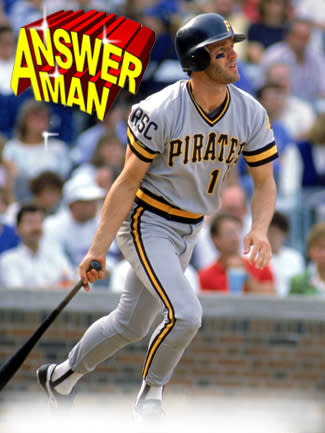
If you don't remember Andy Van Slyke in his prime, think Grady Sizemore — but extremely quotable. Steve Finley, with pizazz. Bernie Williams, but brash.
Van Slyke broke in as a third baseman with the St. Louis Cardinals in 1983, but is more famous for being the guy who played center field next to Barry Bonds for six tumultuous and moderately successful seasons with the Pittsburgh Pirates.
They often clashed, with Bonds calling Van Slyke "The Great White Hope" because of Van Slyke's enormous popularity (and Bonds' relative lack of popularity) with the Steel City's Caucasian majority fanbase.
Van Slyke, in turn, disliked what he and others saw as a surly and selfish budding superstar.
Bonds since has broken the big records and, still embroiled in BALCO, apparently waits for his final season to start. Van Slyke is a first-base coach with the Detroit Tigers, a seemingly remote spot for a guy usually in the middle of the action. He still speaks his mind, though, and controversy sometimes follows.
Q: There is a blog called, "Where Have You Gone, Andy Van Slyke?" Other than literally, what might the question be trying to answer?
Andy Van Slyke: I can only guess that, for guys in their 30s and 40s who watched me play, they understood that the score never mattered and my paycheck never mattered (in relation) to how I played. I played with Little League enthusiasm and professional flair. That's what fans are really looking for.
Q: You won five Gold Gloves and made three All-Star teams. Did your career end as you thought it might?
AVS: I always thought I'd win a World Series as a player. I always considered myself a winning player, a player who was more concerned about winning than anything else. I had four opportunities and missed out on all of them. The reality of it is, you have very little control over those bigger things in the game. It's a lot like life. I think 99 percent of what goes on in life, we have very little control over. The 1 percent, I thought, was going to be big enough for me to contribute to something bigger than myself. It didn't happen. That didn't mean I left anything behind. I had as much or more fun as anyone. I left body parts and skin and sweat all over the United States. I regret nothing.
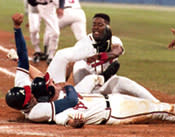
Q: There's an urban legend in Pittsburgh that, from center field, you tried to wave Barry in to play more shallow in left before Francisco Cabrera's famous game-winning hit in the 1992 NLCS.
AVS: That's not a legend, that is not a rumor, that is an absolute, 100-percent, truth that I did.
Q: Was he just ignoring you?
AVS: I always felt that I got a sixth sense on the field that, as an outfielder, I had these premonitions that seemed to come true about half the time. I just felt, given when I saw, that Cabrera was going to hit the ball to left field and nowhere else. Based on scouting reports, based on the count, and that he had just ripped the ball down the left-field line foul when it was 2-0. I was trying to make Barry move in to not let the winning run score from second. He chose to ignore me. Now, if he had moved in two steps, I don't know if it would have made a difference. I'll never know that. It might have been a harder play for him because the ball was hit to his left a little.
Q: Maybe he could have trusted you?
AVS: Barry was a great player. It's sort of like, dealing with Barry made me a greater player in center. But also, it was sort of like being a catcher with a pitcher. He made the last decision. He chose not to move. The unfortunate thing was, if the ball had been hit 10 more feet to his right, I have no question he would have thrown out Sid Bream.
Q: Where should we rank Barry in the history of great players?
AVS: He's certainly in the top five of all time in my opinion. Maybe in the top ... I never saw Willie Mays play in his prime. Never saw Henry Aaron. Babe Ruth. Without even thinking about it, he's in the top five. One of the things, unfortunately, that Barry never will be remembered as is the complete, great player he was before BALCO became a part of his life. Before that, he was going to be in the Hall of Fame. I think he should be in the Hall of Fame, I think he will be in the Hall of Fame. But he was able to transform his career from that of a speedy, dangerous player on the bases to, obviously, the guy with the most home runs, ever, in the game. No one could ever have predicted it.

Q: How did you feel after punching Barry in the nose?
AVS: Punch him in the nose? Did I punch him in the nose?
Q: I read it in a Jeff Pearlman book (called "Love Me, Hate Me: Barry Bonds and the Making of an Antihero" — P. 94).
AVS: We had an argument once, yeah. It was the best thing that could have happened to our working relationship. After that, we understood each other and got along much better. I always respected Barry Bonds, and I wanted to let him know that I did in a certain way.
Q: Did he have it coming?
AVS: A lot of times, people outside of locker rooms don't understand that some things that happen there make it a completely different work environment from anything else out there. Outside of baseball, a lot of people in different environment say, "You should never let something like that happen, regardless." In baseball, things happen that are timely and necessary.
Q: If the Tigers ever were to sign him, would you give him a big hug?
AVS: Absolutely. And I would tell him to hit 30 home runs — or else I'll punch him [laughs].
Q: After everything baseball's done for you, do you still feel you should have pursued meterology?
AVS: Ha! Well, I probably missed an opportunity — put it that way. Financially, certainly.
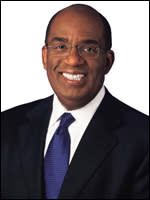
Q: There's big money in being a weatherman?
AVS: Well, there's big money in that, in the expansion of cable TV, the opportunities to branch off into other areas of media are certainly there. When you consider what meteorology has done to a few guys in our society — like David Letterman — it was probably an opportunity I didn't take advantage of.
Q: You have two boys (A.J., 24, with the Cardinals organization, and Scott, 21, with the Dodgers) in pro baseball?
AVS: I have two boys in pro ball, a freshman in college (Jared, a freshman QB at Southeast Missouri) and a fifth-grader.
Q: Do you wish you could be with the older kids and help them?
AVS: I just wish I could watch them play. I wish, more than anything else, I hope they supersede anything I ever did on the field. I say that because I'd rather be remembered as being their father than they being remembered as my sons. It's a hard thing. I don't care what you do - baseball or politics — George W. Bush is always going to be compared to his father. I just want it to be an easy answer in 50 years — Who was the better player, me, or my kids? I want it to be my kids.
Q: Maybe one of them will be a weatherman.
AVS: Ha! Yeah, who's the most famous weatherman today?
Q: Mmm. Al Roker?
AVS: Al Roker! Maybe they'll say he wasn't as good as Roker, but was certainly thinner.
Q: Is being a first-base coach kind of like being vice president?
AVS: Actually, it might be worse than being vice president. You probably do less at first base.
Q: So what do you do over there?
AVS: Try to advise the guys who have some speed, who might be able to take an extra base, of the pitcher's move. Does he have one? How good is it? The catcher's arm. The outfield arms. "Pay attention to the third-base coach," or "Watch for the steal sign." I don't overload them, I just try to give them one or two important things to think about.
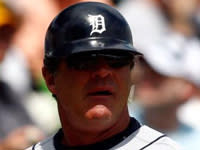
Q: You base coaches are wearing helmets this season. Why not just give you a mitt while they're at it?
AVS: Mitts, shin guards, cups. I don't know, put us in a cage. The ridiculous turns to sublime. I don't understand. For 100 years, it never became an issue. I think it's eyewash, personally. I don't think the helmet will protect anybody from getting killed. If you get hit in the right spot with a baseball — like in the neck, which happened to Mike Coolbaugh anyway. We're wearing ‘em and probably will for a long time.
Q: Where does "eyewash" come from?
AVS: I don't know the term "eyewash."
Q: Didn't you just say it?
AVS: I did. I don't know where the term came from. I guess it's just a nice way, a politically correct way, of saying that a guy is being disingenuous.
Q: When you and Ozzie Guillen traded barbs a couple of years ago, and you said you would "punch" him if he ever showed you up in the dugout, some of your other comments were portrayed as negative generalizations of Latino ballplayers.
AVS: I was misquoted.
Q: On Sporting News radio, you said, "He is, if you want to call it, an atypical Latin baseball player. I don't believe that it's true for all Latinos, but a lot of people's perception is that Latinos are hot-headed. He has certainly shown that he gets a little upset and a little excited about the littlest, silliest things." [Here's the entire story by SportsTicker, the quality of which is severely questioned here by our own MJD.]
AVS: And then he slammed me which, knowing how Ozzie reacts when things are said about him or his team, I knew that was coming.
Q: Did it hurt you at all, because of how the stories were written? Like, if some team was considering you to manage might dismiss you because of the so-called way you think of Latinos?
AVS: I don't know if it has; it doesn't matter. I know what I said and I know what I meant. A reporter turns what I said around and uses it to start or stir up a controversy — I have no control over that. Having played with Latin players, I know the perception of them being hot-headed isn't true. I can't make it any more clearer than that. And people wonder why players and managers get pissed off at the media? Well, there it is, a microcosm of exactly why some are given a reason to not deal with the media or respect the media. Because they'll take something like that and use it while knowing exactly what they're doing. I never got an apology from the writer, or from anybody. Which is worse than doing it to me in the first place.
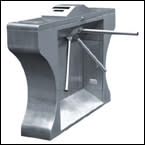
Q: Do the CTA and other rapid transit systems have your wanted photo posted all about because you're a turnstile-hopper?
AVS: I got slammed up against a wall, my wife [Lauri] and I, in New York last year. Well, not slammed. Strongly encouraged to get up against the wall. Verbally slammed.
Q: Did you kind of enjoy it as a "New York" moment?
AVS: Oh, I was having a really good time. My wife was so mad at me, which made it even more fun. Here's my wife dressed up, looking beautiful, I'm trying to look dashing. The greatest thing was from the people in the subway: "Hey, Andy, go Tigers! Go get ‘em! Hey, Andy, I didn't know you were a jumper!" I'm laughing, having a good time, and the cops keep looking at me and my wife, going, "Who ARE these two people?" I just thought it was great. I'm not embarrassed at all. I was having fun with it. The best part was, it was a male cop and a female cop, and the female cop did my ticket. I had my hands in my pockets and she told me to take them out. I told her, "Don't worry, ma'am, I don't have a gun — but I am packin'.
Q: You shouldn't do that with cops, Andy.
AVS: I thought it was a funny line.
Q: It was. Did the Pirate Parrot ever offer you any drugs?
AVS: No, but is he offering now [laughs]? I'd like to take him up on his offer if he was starting ‘er over again.
Q: You missed the really gaudy uniform period with the Pirates. Do you consider yourself blessed or cursed that you never got to wear all gold?
AVS: Aw, man. I would have loved to wear those. I love those retro uniforms, no question. Like the powder blues of 1983 in St. Louis. I would have felt like a king with those stars on their caps.
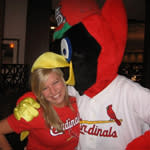
Q: Who wins in a fight: the Parrot or Fredbird?
AVS: Oh, I think the Parrot. He's got a much stronger beak. It's all about biceps in humans and beaks in birds.
Q: Where were you when the automatic tarp tried to eat Vince Coleman?
AVS: I was not in harm's way. I was in the outfield. That tarp was hungry for attention. It was always under ground while his buddies were rolled up on the field. We never really needed a tarp, either
Q: Were you bitter about the Don Denkinger call in the '85 Series?
AVS: Sure. I don't think anyone wants any decision outside of the players play to decide the outcome of a game.
Q: How long did it take to let it go?
AVS: How long? I'll let you know how long.
Q: You took over for Lenny Dykstra in center field for the Phillies at the Vet in 1995. I just imagine him leaving it filthy.
AVS: It was probably worse when I was playing against him. When he was out there, there was all sorts of debris that he left behind. Stains. Easily, the EPA could have come in and quarantined a large circle in center field. If you stood long enough in area, it would be like second-hand smoke; second-hand tobacco certainly was present.
Q: How sweet is it to be 367th on the career homer list?
AVS: Oh, it's awesome. I should have kept playing. Maybe I'd have made it to 262.
Q: Didn't your bad back force you out?
AVS: Yeah, but if I had taken the Pirate Parrot's offer, maybe I could have kept playing.
Word Association:
Don Fehr — Argumentative.
Bud Selig — Polite.
Jack Buck — Warm.
Q: What's it like to have spent so much of your life with Jim Leyland?
AVS: It's never dull and always smoky.
Q: If someone makes a statue of Leyland some day, should it be smoking?
AVS: If they don't put a cigarette in his hand, they shouldn't build it.
Q: Seriously, why didn't Bonds just move in?
AVS: Because he's a [bleeped by request].
• David Brown is a regular contributor to Big League Stew and writes Morning Juice, which runs Monday-Friday in the a.m. Answer Man is a regular feature on BLS.
Previous Answer Men:
• Hunter Pence — April 10 • Justin Morneau — April 17 • David Wright — April 24

 Yahoo Sports
Yahoo Sports 
